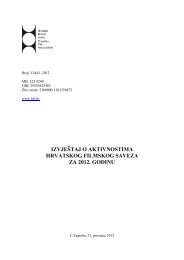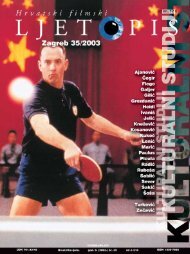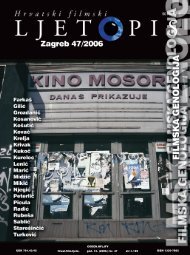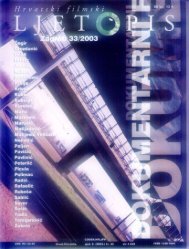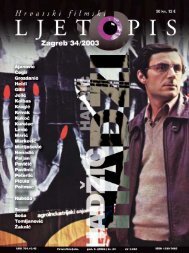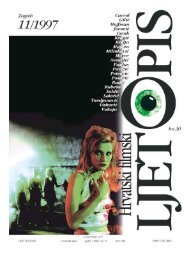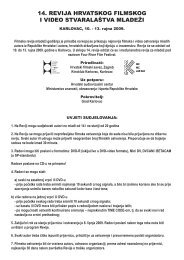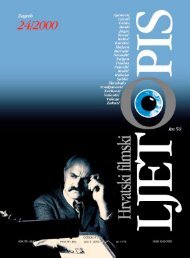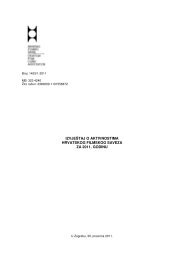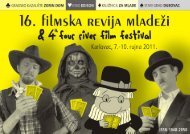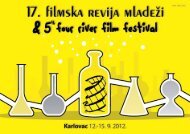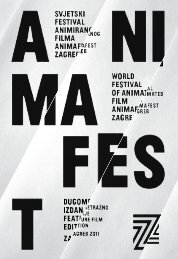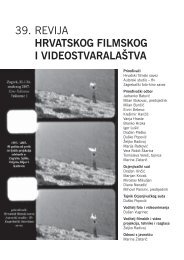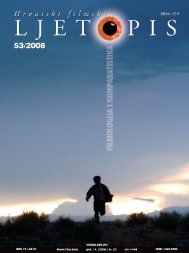Hrvatski filmski ljetopis, broj 56 (2008) - Hrvatski filmski savez
Hrvatski filmski ljetopis, broj 56 (2008) - Hrvatski filmski savez
Hrvatski filmski ljetopis, broj 56 (2008) - Hrvatski filmski savez
You also want an ePaper? Increase the reach of your titles
YUMPU automatically turns print PDFs into web optimized ePapers that Google loves.
hfl_<strong>56</strong>-q6.qxp <strong>2008</strong>-12-18 15:22 Page 172<br />
Najslo`eniji zadaci u radu filmskog arhivista odnose se na vrednovanje<br />
filmskoga gradiva. Taj je zadatak u obradi filmskoga gradiva najmanje obra-<br />
|ivan u stru~nim i znanstvenim radovima, pa je ovaj rad upravo prilog tome<br />
podru~ju. Vrednovanju prethodi izrada kriterija koji }e se temeljiti na stajali{tu<br />
cjelovitosti filmskog djela kao dijela filmskog i ukupnog kulturnog<br />
naslije|a. Za utvr|ivanje vrijednosti i kriterija prosudbe filmskoga gradiva<br />
potrebno je, osim temeljitog poznavanja nacionalne kulturne ba{tine, povijesti<br />
i specifi~nosti razvoja hrvatske kinematografije, i temeljito poznavanje<br />
nastanka i razvitka europskog i svjetskog filma, glavnih pravaca i zna~ajki<br />
svjetske knji`evnosti, posebno u 19. i 20 stolje}u, tako|er i likovnih i glazbene<br />
umjetnosti, kao sastavnica u nastajanju filmskog djela.<br />
Filmsko gradivo koje se trajno ~uva u Hrvatskoj kinoteci istodobno je i arhivsko<br />
gradivo te podlije`e i zakonitostima obrade arhivskoga gradiva.<br />
Mnoga antologijska djela hrvatske kinematografije predstavljaju kulturno<br />
dobro najve}e vrijednosti, a hrvatska je filmska ba{tina istodobno sastavni<br />
172<br />
Hrvat. film. ljeto, Zagreb / god 14 (<strong>2008</strong>), br. <strong>56</strong>, str. 167 do 174 Sa`eci / Summaries<br />
prevelike du`ine) te posebni program `urnala Hrvatska u rie~i i slici. Na festivalu<br />
su, uklju~uju}i one iz NDH, prikazani filmovi 14 zemalja: Italije,<br />
Njema~ke, Bugarske, Danske, Finske, Nizozemske, Norve{ke, Portugala,<br />
Rumunjske, [vedske, [vicarske, [panjolske i Ma|arske; festival se odr`avao<br />
od 28. VIII. do 15. IX. 1942. Strani novinari posebno su dobro do~ekali<br />
film Stra`a na Drini; prenose se opse`ni citati iz talijanskih novina. Copa<br />
Mussolini za najbolji njema~ki film dobio je film Veliki kralj (Der Große<br />
König) Veita Harlana; Copa Mussolini za najbolji talijanski film dobio je<br />
film Bengasi Augusta Genine; Coppa Volpi za najbolju glumicu dodijeljena<br />
je Kristini Söderbaum za film Zlatni grad (Die Goldene Stadt) Veita Harlana,<br />
dok je kao najbolji glumac nagra|en Fosco Giachetti za spomenuti Bengasi.<br />
Nagradu Me|unarodne slikopisne komore dobio je Zlatni grad zbog<br />
upotrebe boje, dok je predsjednik Me|unarodne slikopisne komore nagradio<br />
ma|arski film Alfa Tau za monta`u.<br />
No tu nagradama nije bio kraj — medaljama je nagra|ena sekcija dokumentarnih<br />
filmova. U toj je sekciji nagra|ena i Stra`a na Drini. Zna~aj ove nagrade<br />
se od 1942. godine pa do danas znatno preuveli~avao, stoga treba navesti<br />
da je tu medalju uz Stra`u na Drini dobilo jo{ deset drugih filmova.<br />
Nagra|ena je tako Italija za filmove Comachio, Muzika vremena (Musica<br />
del tempo) i Alpinisti i orlovi (Rocciatori e Aquile), Njema~ka za filmove<br />
Morski orao (Der Seeadler), Razne melodije (Bunter Reigen) i Promjene u zemlji<br />
(Erde Aufgewaltmärchen), [vicarska za film Zastava ~ovje~nosti (Le<br />
drapeau de l'humanite), Rumunjska za film Rimska zemlja (Terra di Roma)<br />
te Ma|arska za filmove Mala kukavica (A kis kakuk) i @ivot i smrt Stjepana<br />
Horthya. Me|utim, uz »glavne«, podijeljene su i jo{ neke »nagrade Biennalea«:<br />
Ma|arskoj za film Ljudi na gori (Emberek a havason), Italiji za Mi<br />
`ivi (Noi vivi), Njema~koj za Be~ka krv (Wiener Blut), [panjolskoj za film<br />
Goyesca, Njema~koj za film Velika sjena (Die Grosse Schatten), Portugalu<br />
za film Alla ariba i Rumunjskoj za film Odessa u plamenu (Odessa in fiamme).<br />
Medalje Biennalea podijeljene su [vedskoj za film Strijelci (Snapp Hanar),<br />
Finskoj za film Preko granice (Yli rajan), [panjolskoj za Prokleto selo<br />
(La Aldea maldita) te Ma|arskoj za film Ispa{tanje (Negyediziglen).<br />
ARHIVISTI^KI PRILOZI<br />
Mato Kukuljica, Carmen Lhotka<br />
Zoran Lhotka, nakon pet godina<br />
Prilog o `ivotu i radu Zorana Lhotke, majstora zvuka i vode}eg hrvatskog<br />
foley artist-a, koji je svojim radom obilje`io nekoliko desetlje}a hrvatskoga<br />
filma, tj. njegova audiotivnog dijela, kao muzi~ki voditelj, majstor zvuka,<br />
izumitelj, eksperimentator u podru~ju zvu~nih efekata i {umova, te na koncu<br />
kao restaurator zvuka u Hrvatskoj kinoteci od 1980. Prilog donosi biografsku<br />
bilje{ku o njemu, te kompletnu filmografiju njegova rada u filmskoj<br />
industriji.<br />
Mato Kukuljica<br />
Vrednovanje filmskoga gradiva UDK: 791:930.25<br />
NDH was represented by the middle-length documentary Watch on the<br />
Drina, cultural film Baroque in Croatia (Barok u Hrvatskoj), documentary<br />
The Youth of Croatia / Ustasha Youth Work Service (Mladost Hrvatske /<br />
Radna slu`ba Usta{ke mlade`i; withdrawn because of its length) and the special<br />
programme of the newsreel Croatia in Words and Pictures (Hrvatska u<br />
rije~i i slici). The Festival presented films from 14 countries, including those<br />
from NDH: Italy, Germany, Bulgaria, Denmark, Finland, the Netherlands,<br />
Norway, Portugal, Romania, Sweden, Switzerland, Spain and Hungary. The<br />
Festival ran from 28 August to 15 September 1942. Watch on the Drina was<br />
received by foreign journalists especially well; comprehensive citations from<br />
Italian newspapers are presented. The Copa Mussolini Award for best<br />
German Film went to the film The Great King (Der Große König) by Veito<br />
Harlan; the Copa Mussolini Award for best Italian film was granted to the<br />
film Bengasi by August Genina; the Copa Mussolini Award for best actress<br />
went to Kristina Söderbaum for the film by Veito Harlan. Fosco Giachetti<br />
was awarded as the best actor for the film Bengasi. The International Film<br />
Chamber Award was given to The Golden City (Die Goldene Stadt) because<br />
of its use of colour, while the President of the International Film Chamber<br />
awarded the Hungarian film Alfa Tau for editing.<br />
However, there were more awards — the documentary section was awarded<br />
with medals. Watch on the Drina was also awarded as part of this section.<br />
The importance of this award has been significantly exaggerated from 1942<br />
to this date and therefore it should be mentioned that this award was given<br />
to ten other films, besides Watch on the Drina, as well. Italy was awarded for<br />
the films Comachio, Musica del tempo and Rocciatori e Aquile, Germany for<br />
the films Der Seeadler, Bunter Reigen and Erde Aufgewaltmärchen,<br />
Switzerland for the film Le drapeau de l'humanite, Romania for the film<br />
Terra di Roma and Hungary for the films A kis kakuk and Life and Death of<br />
Stjepan Horthy. However, apart from the »principle« awards, the Biennale<br />
Awards have also been granted to: Hungary for the film People on the Alps<br />
(Emberek a havason), Italy for We the Living (Noi vivi), Germany for Vienna<br />
Blood (Wiener Blut), Spain for the film Goyesca, Germany for the film Der<br />
Grosse Schatten, Portugal for the film Alla ariba and Romania for the film<br />
Odessa in Flames (Odessa in fiamme). Biennale Medals were granted to<br />
Sweden for the film Scanian Guerilla (Snapp Hanar), Finland for the film Yli<br />
rajan, Spain for The Cursed Village (La Aldea maldita) and Hungary for the<br />
film To the Fourth Generation (Negyediziglen).<br />
FILM ARCHIVES<br />
Mato Kukuljica, Carmen Lhotka<br />
Zoran Lhotka, five years later<br />
A text on the life and work of Zoran Lhotka, sound designer and editor<br />
and leading Croatian foley artist, who marked several decades of Croatian<br />
film, i.e. its auditory part, as music director, sound designer, inventor,<br />
experimentator in the field of sound effects and noise, and in the end as<br />
sound restorer at the Croatian Cinemateque since 1980. This text contains<br />
biographical notes on Lhotka and a complete filmography of his work in<br />
the film industry.<br />
Mato Kukuljica<br />
Evaluating film material<br />
UDK: 791:930.25<br />
The most complex task in the work of a film archivist is the evaluation of<br />
film material, particularly pieces that have been least analysed in professional<br />
and scientific studies. This article is a contribution to that field of<br />
work. Prior to evaluation it is necessary to establish the criteria which<br />
should be formed from the standpoint of the film as a whole and as part of<br />
the overall film and cultural heritage. In addition to a thorough understanding<br />
and knowledge of national cultural heritage, history and characteristics<br />
of the development of Croatian cinematography, determining the<br />
values and criteria based on which film material is to be judged requires a<br />
thorough understanding of the emergence and development of European<br />
and world film, main trends and characteristics of world literature, especially<br />
of the 19th and 20th century, and of the visual and music arts, as<br />
components in the creation of a film piece.<br />
Film material that is permanently preserved in the Croatian Cinemateque<br />
is at the same time archival material and must be treated as any other<br />
H R V A T S K I F I L M S K I L J E T O P I S <strong>56</strong>/<strong>2008</strong>.



